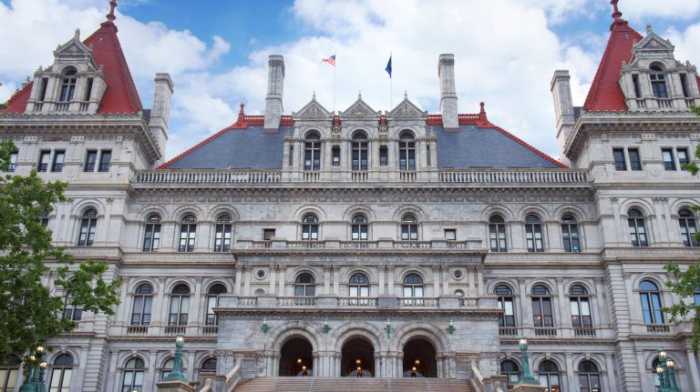While momentum continues to grow for charging motorists a toll to cross the East River and Harlem River bridges in order to offset the projected Metropolitan Transportation Authority (MTA) budget deficit, some lawmakers are trying to squash any toll on the free bridges.
In response to Assembly Speaker Sheldon Silver’s proposal to charge motorists $2 at the East and Harlem River crossings – a scaled back version of the Ravitch Commission recommendation of $5 – a mix of city and state lawmakers held a press conference at the foot of the 59th Street Bridge last weekend denouncing the tolls.
“It’s an unfair tax, and it’s particularly rubbing salt in the wounds of those paying the tax,” said Queens Assemblymember Rory Lancman, who has opposed tolls on the bridges since the Ravitch report came out during the end of 2008. “Most people who drive into Manhattan don’t have a safe and reliable and efficient mass transit option. You are taxing the people that are not benefiting from the system.”
Currently, the State Legislature is considering options for raising additional funds to close the projected $1.2 billion MTA operating budget gap for this year. When the Commission headed by former MTA head Richard Ravitch presented its report last year, it recommended $5 tolls on all the East and Harlem River bridges and a payroll tax of one-third of one percent on employers. Silver is terming his $2 proposal a compromise, and it is drawing support from a number of groups.
“His plan is very good news for eight million daily subway and bus riders and suburban commuters,” said Gene Russianoff, the staff attorney for the Straphangers Campaign. “Speaker Silver’s proposal reflects the widely-held view that the different sectors of New York’s economy directly benefiting from transit – riders, motorists and businesses – should all contribute to the system’s continued well-being.”
While Silver’s backing of the $2 toll likely means that the Assembly would approve the plan, it is unclear if there are enough votes to pass it in the State Senate. On Monday, March 2, the Senate asked the MTA to turn over their finances so that they could inspect them before coming to an agreement on a plan.
“As a result of this access to a previously unavailable accounting of the MTA’s finances, it is now possible for a full vetting of MTA finances which will allow us to determine the best course of action to address the MTA’s budget shortfall,” Senate Majority Leader Malcolm Smith said in a statement on Monday, March 2.
Meanwhile, Queens State Senator Joseph Addabbo, who represents western and southern parts of the borough, has many issues with the Ravitch report, but one thing he would like to see is more oversight on the MTA finances.
“I mean some constant oversight specifically on the MTA spending,” said Addabbo, who suggested either the city or state comptroller or another independent agency similar to the city’s Independent Budget Office, which would be entirely dedicated to monitoring MTA spending.
The MTA has a $1.2 billion budget gap, and if the agency does not receive state aid by March 25, it plans to institute a 23 percent fare hike on buses and trains as well as service cuts to many lines in Queens and throughout the city.
As the two legislative bodies continue to debate the merits of the proposals, the tolls on the bridges are continuing to fuel the debate and controversy.
“I think it’s the kind of thing that is going to hurt small businesses that rely on the free bridges,” said City Councilmember David Weprin, who chairs the Council’s Finance Committee. “In a recession and a tough economy when a lot of businesses are hurting, now is not the time to discourage people from going into Manhattan.”
Meanwhile, Assemblymember Mark Weprin, who is the Chair of the Assembly’s Small Business Services (SBS) Committee, is one of the only representatives whose district is not served by any subways or Long Island Rail Road (LIRR) stops.
“This is actually worse than congestion pricing, which was bad, because small businesses who go in and out of the city maybe three or four times a day – especially Queens businesses – they will get hit every time,” Weprin said






























